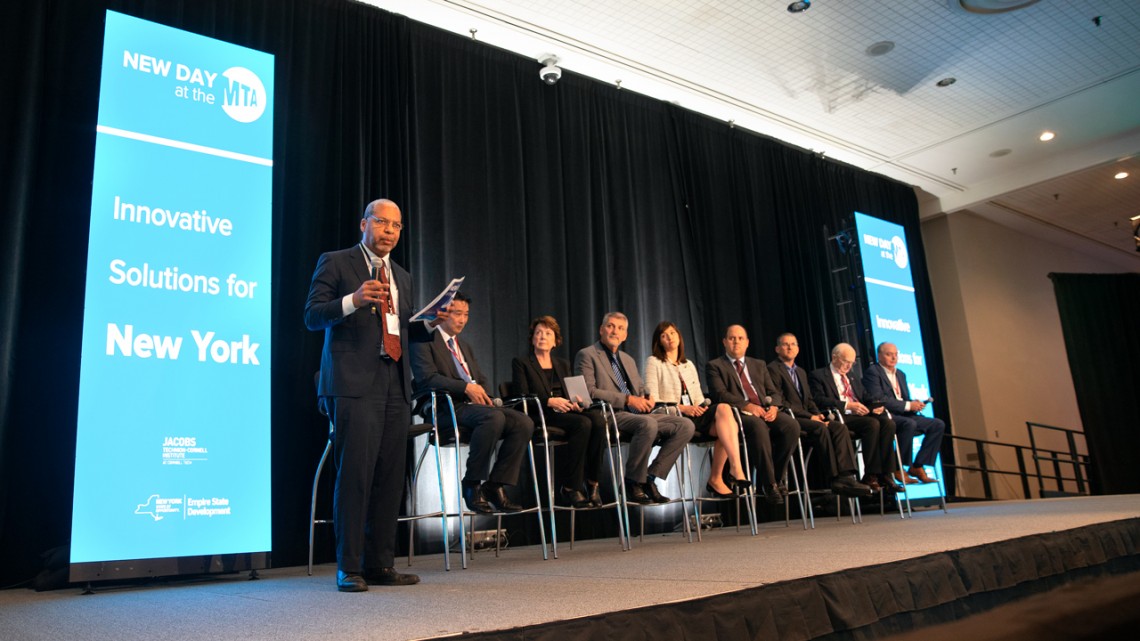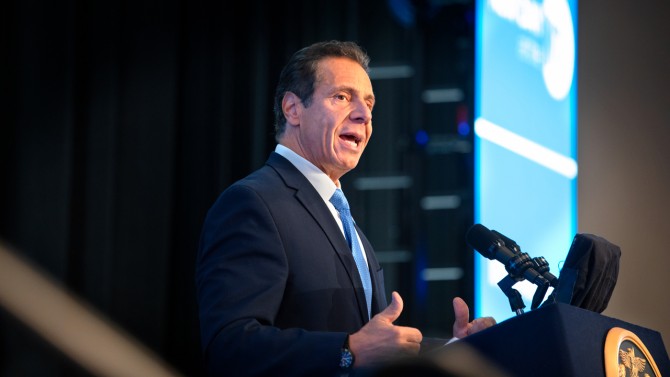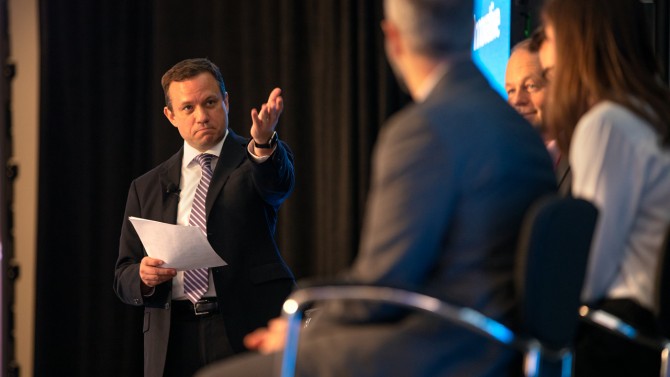
Lance Collins, the Joseph Silbert Dean of Engineering, moderates a panel on engineering and construction innovations at the “New Day at the MTA” conference.
Cornell partners with MTA to jump-start transit innovation
By Melanie Lefkowitz
New technology can get the subways back on track.
Collaborations between academia, industry and the public sector are needed to modernize New York state mass transit, according to speakers and panelists at the “New Day at the MTA” conference, Sept. 20 at the Jacob K. Javits Center in Manhattan.
The conference, co-sponsored by the Metropolitan Transportation Authority (MTA), the Jacobs Technion-Cornell Institute at Cornell Tech and the Empire State Development Corporation, explored the myriad solutions officials say are urgently needed by an aging transit system that moves 8.6 million people a day – roughly half the population of New York state.
“I think there is a growing societal disconnect between emerging technology and government projects, and I believe it is hurting this state and this country,” said New York Gov. Andrew Cuomo, who launched the conference with a call to return to the ingenuity that built the subway in the first place. “The stark reality is that we cannot succeed long term without new technology and new companies entering the field.”
The conference continued Cornell’s collaboration with the MTA earlier this year, which averted a shutdown of the L train so dreaded that New Yorkers dubbed it the “L-pocalypse.” Considering fresh perspectives that incorporate emerging technology was vital both for the L train project and for the sustainability of the entire transit system, speakers said.
To help develop these kinds of solutions, the Jacobs Institute is launching a master’s degree concentration in urban tech in fall 2020. The degree concentration was announced at the event by Greg Morrisett, the Jack and Rilla Neafsey Dean and Vice Provost of Cornell Tech.
“We want to design technologies to make cities more connected, livable and sustainable,” Morrisett said. “We’re launching this program because we at Cornell Tech are committed to furthering the public good, by helping break down barriers and facilitate partnerships between tech, academia and the public sector.”
Students in the urban tech concentration will earn dual master’s degrees – an M.S. in information systems from Cornell University and an M.S. in applied information science from the Technion-Israel Institute of Technology. They’ll apply machine learning, data science, human-computer interaction and product design to develop tools for government, real estate and other emerging urban tech sectors-
“Cornell Tech’s continued commitment to education and to preparing the next generation of innovators and transit leaders is inspiring and deeply needed,” said Patrick Foye, chairman and CEO of the MTA.
The concentration is the result of a collaboration between the College of Architecture, Art and Planning, Cornell Engineering and the Jacobs Technion-Cornell Institute at Cornell Tech.
“With complex systems operating within larger systems, cities naturally demand interdisciplinary study,” said Ron Brachman, director of the Jacobs Institute and professor of computer science, who served as Cornell’s program chair for the MTA forum.
Though advances have been made in recent years, many aspects of the MTA’s operations remain archaic: Some subway cars date to the 1950s, and they rely on 1980s technology for signaling, which prevents collisions and derailments and helps trains arrive on time.
At the event, which was attended by more than 500 people, Cuomo and other transit leaders appealed to representatives from tech companies to partner with the MTA on new products and innovations. Morrisett, Brachman and Lance Collins, the Joseph Silbert Dean of Engineering, were among the moderators of five panels that sought to explore the challenges and opportunities of these partnerships.
“How can we make a seamless connection, a pipeline, that starts with innovation that occurs largely in either research universities or laboratories elsewhere, and move that into product development and ultimately implementation?” Collins said. “We want to use the technology of today, but we also want to create the technology of tomorrow.”
In January, Collins and Thomas O’Rourke, the Thomas R. Briggs Professor in Engineering in civil and environmental engineering, joined a team of experts in helping Cuomo avert the planned 15-month shutdown of the L train. Along with engineering professors at Columbia – including Mary Boyce, dean of the Fu Foundation School of Engineering and Applied Science – the team developed a solution that allowed the train’s Canarsie Tunnel, which connects Manhattan to Brooklyn, to remain operational during its much-needed repairs.
The successful collaboration can serve as a model for transit innovation, speakers at the conference said.
“By partnering together,” Morrisett said, “the people in this room today – the senior government officials, the academic thought leaders, the groundbreaking business executives, the science and technology experts – can lead us into this new era, showing New York how to do more by thinking creatively.”
Media Contact
Get Cornell news delivered right to your inbox.
Subscribe



